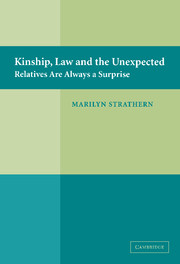Book contents
6 - Divided Origins and the Arithmetic of Ownership
Published online by Cambridge University Press: 08 January 2010
Summary
Borrowing information between groups characterises Papua New Guinea … The sharing of information only requires permission or the exchange of gifts. No actions should be taken that might stop the flow of information exchange through traditional channels.
Nick Araho, Seminar on Intellectual, Biological and Cultural Property, Port Moresby, 1997; Whimp and Busse 2000: 186–8Anthropologists do not generally go about their business thinking that their subject matter is a contingency. Yet that invariably becomes the case when the ethnographic record – however vast – or models of social structure – however illuminating – are brought into relation with other bodies of material. They are hardly alone in this. Insofar as bodies of knowledge form systems, other efforts must lie outside, part of the environment not part of the system.
One body of knowledge that perpetually strives toward the systemic is law. Indeed this reflection on contingency is prompted by Barron's (1998) discussion of the influences that in 1991 were brought to bear on the Australian Federal Court that upheld (against his will in this case) the appropriateness of copyright as a property relation between an Aboriginal artist and his carving of a sacred emblem. In asking how this legal recognition had come about in the first place, she discusses a number of what she calls contingent issues, issues that in her view belonged to the environment not to the system.
- Type
- Chapter
- Information
- Kinship, Law and the UnexpectedRelatives are Always a Surprise, pp. 135 - 162Publisher: Cambridge University PressPrint publication year: 2005

